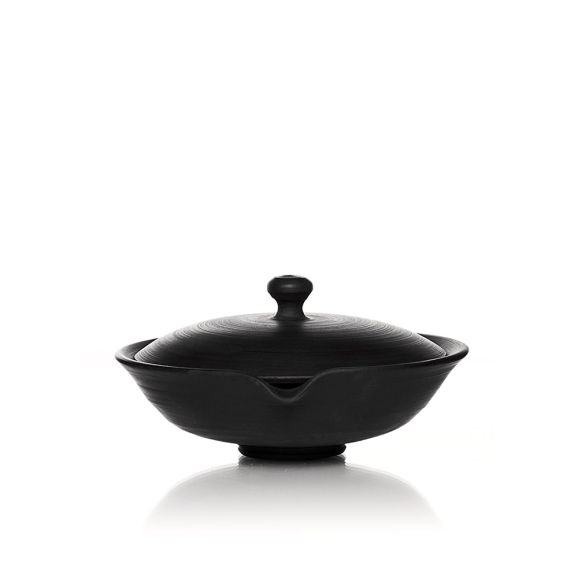Free shipping from $55
Description
A Traditional Shiboridashi
This clay shiboridashi is the masterpiece of Yukitaka Umehara, a skilled artisan from Tokoname, a city in Aichi Prefecture.
Each piece is meticulously handcrafted on a potter's wheel, with precise attention to every detail. The deep black color of the clay is achieved through a unique double reduction firing process in the Gyokko kiln, a technique with over 60 years of history.
With a capacity of 1.7 oz (5 cl) and a traditional shape, this shiboridashi is ideal for steeping delicate Japanese green teas, where the porous clay enhances the tea's rich aromatic profile.
Learn More About the Shiboridashi
The shiboridashi is a traditional Japanese tea vessel designed for steeping green teas like Gyokuro, known for its rich, complex flavors, as well as Sencha and Kabusecha. Since these teas steep at relatively low temperatures (between 122°F and 158°F), the shiboridashi can be used without the risk of burning.
Its small size is perfect for extracting a brew that reveals all the nuances of premium Japanese green teas.
Tokoname clay is a dense, microporous material that develops a patina over time. Its unique properties bring out the subtleties of the texture and flavors in the infused Japanese tea.
The black color of the clay is achieved during firing by depriving the kiln of oxygen, a process known as "reduction firing."
An Ideal Tool for Senchado
The traditional preparation of Japanese teas is inspired by a ceremony known as Senchado, part of the Way of Tea (Chado), alongside Cha No Yu. The key difference between the two is the tea used: Cha No Yu centers around Matcha, while Senchado focuses on loose leaf teas (Gyokuro, Kabuse, Sencha).
The Senchado technique can be practiced in two ways:
- Using a Kyusu: the traditional Japanese teapot
- Using a Shiboridashi: a vessel similar to a Hohin and reminiscent of the Chinese lidded cup known as Gaiwan.
Advices
Brewing Gyokuro or Kabuse:
Place about 5 grams of tea directly into the shiboridashi.
Add water at the correct temperature (122°F for Gyokuro / 140°F for Kabuse), pouring gently along the walls to avoid burning the leaves.
- 1st infusion: Steep for 1 minute.
- 2nd infusion: Pour out immediately after adding water.
- 3rd infusion (and subsequent ones): Steep for 30 seconds, gradually increasing the water temperature.
For each infusion, pour out every last drop to prevent over-steeping. If serving in multiple cups, evenly distribute the brew among them.
The last, most concentrated drop is always reserved for the guest of honor!
Brewing Sencha:
Place about 3 grams of tea directly into the shiboridashi.
Add water at the correct temperature (158°F), pouring in a circular motion to ensure even infusion from beneath the leaves.
- 1st infusion: Steep for 1 minute.
- 2nd infusion: Pour out immediately after adding water.
- 3rd infusion (and subsequent ones): Steep for 30 seconds, gradually increasing the water temperature.
As with Gyokuro or Kabuse, the last drop is always reserved for the guest of honor!
Brewing Iced Tea Using the Kooridashi Method:
- You can prepare cold tea by replacing water with ice cubes.
- The infusion is complete once the ice cubes on the tea leaves have fully melted, resulting in a concentrated, intense brew, as rare as drops of dew.
